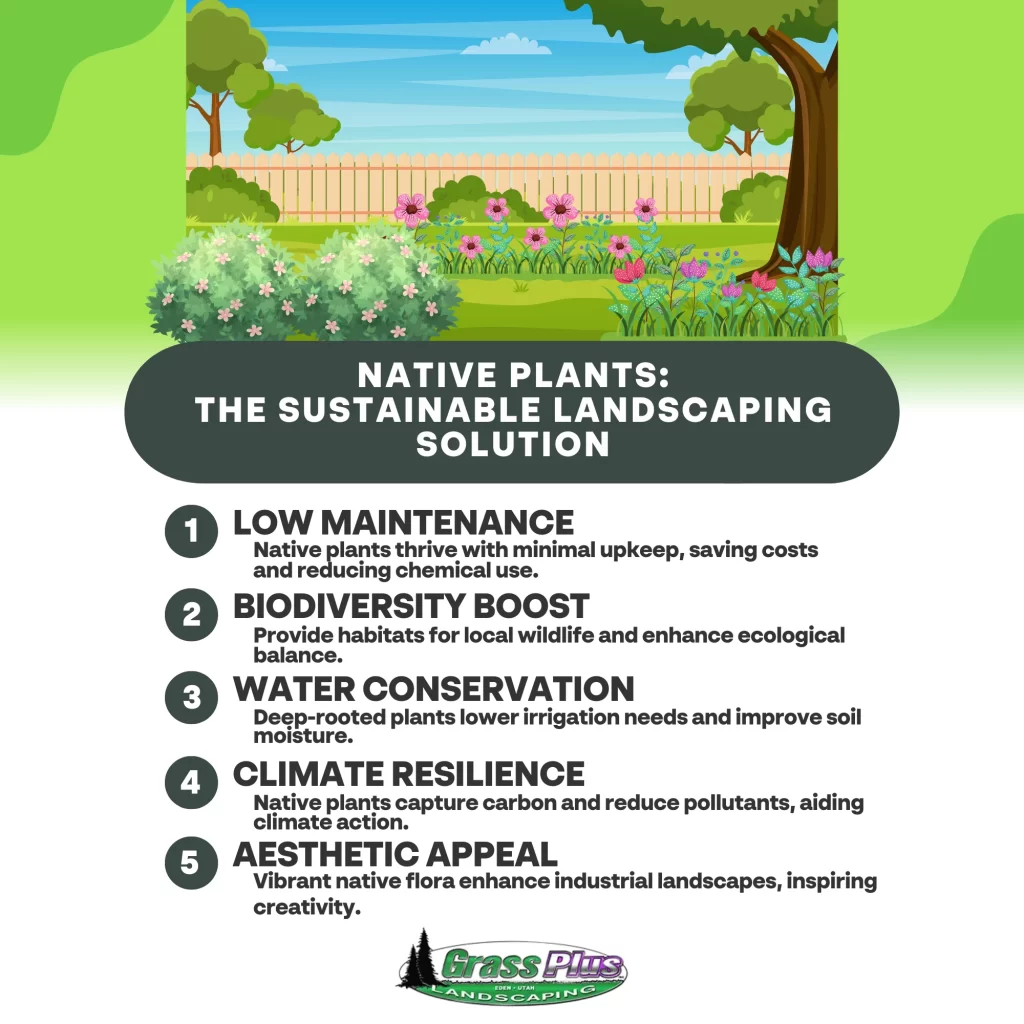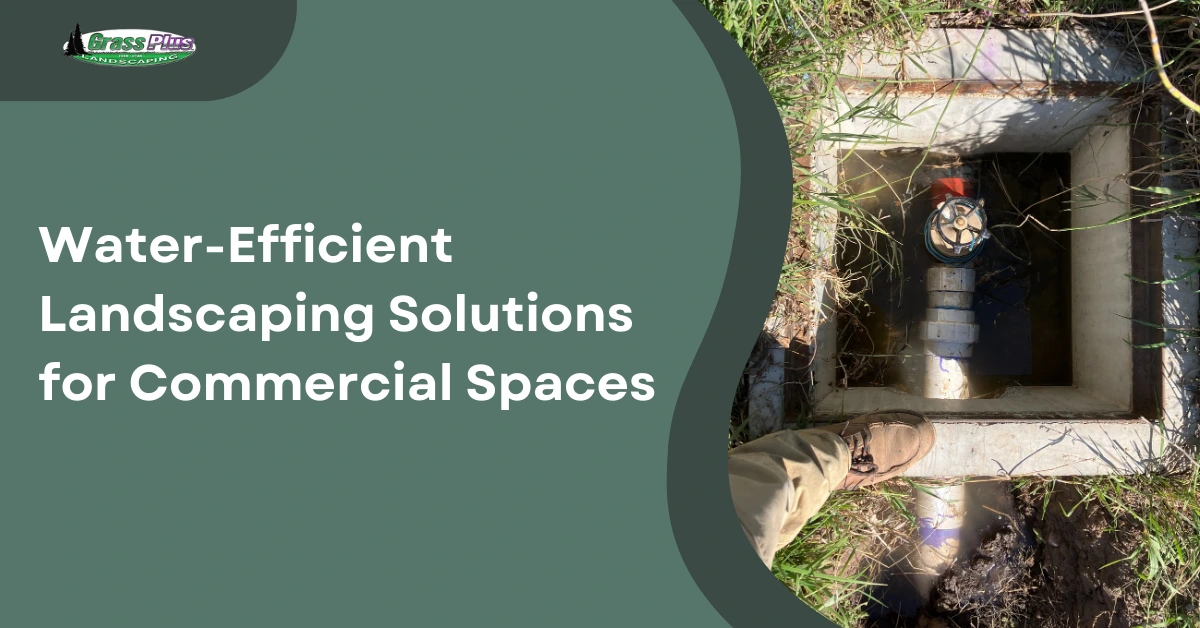Using native plants in industrial landscaping offers you numerous benefits. They require less water, fertilizers, and maintenance, making them a cost-effective choice. Their deep root systems improve soil health and moisture retention while promoting sustainable water management. Native plants also elevate the landscape’s aesthetics, creating a harmonious connection to the local environment that inspires creativity and productivity. They also contribute to better air quality and provide habitats for local wildlife, supporting biodiversity. By creating healthier spaces, they promote employee well-being. Explore other ways native plants can positively impact industrial settings.

Key Takeaways
- Native plants require minimal maintenance and resources, reducing long-term costs and reliance on chemicals in industrial landscaping.
- Their diverse aesthetics enrich the visual appeal of industrial spaces, creating a stimulating environment for employees and visitors.
- Green spaces with native plants improve mood and promote health, offering informal gathering spots for social interaction and relaxation.
- Native plants support biodiversity by providing habitats for local wildlife and contributing to carbon sequestration efforts.
- Utilizing native plants conserves water through reduced irrigation needs and improved soil moisture retention, demonstrating sustainable practices.
Low maintenance
Native plants offer significant advantages in industrial landscaping, particularly regarding low maintenance requirements. These plants are well-adapted to local climates and soil types, which means they typically require less water and fewer fertilizers compared to non-native species. This resilience not only reduces your ongoing maintenance costs but also lessens the reliance on chemical inputs, promoting a healthier ecosystem around your industrial site.
When you engage industrial landscaping services that prioritize native plants, you’re investing in a sustainable solution. Native species are more resistant to local pests and diseases, reducing the need for pesticides. , Since these plants thrive in their natural environment, they also demand less attention in relation to pruning and weeding. This allows your landscaping team to focus on other essential areas of upkeep.
Beauty
Transforming an industrial landscape with native plants not only elevates the aesthetic appeal but also creates a vibrant and dynamic environment. American native plants, with their diverse colors, shapes, and textures, offer a unique visual richness that can soften the harshness of industrial architecture. By incorporating these plants into your industrial landscape design, you can craft a visually stimulating space that draws the eye and captivates the senses.
Native plants are adapted to local conditions, ensuring that they thrive while requiring minimal resources. This adaptability means you’ll enjoy year-round beauty, from the vibrant blooms of spring to the rich colors of fall foliage. Their seasonal changes provide a constantly evolving landscape that keeps the environment fresh and engaging.
Using native species also cultivates a sense of place, connecting workers and visitors to the local ecosystem. This connection enriches the industrial setting, making it a visually appealing landscape that inspires creativity and productivity. By prioritizing beauty through American native plants, you’re creating more than just an industrial area; you’re cultivating a meaningful, aesthetically pleasing environment that positively impacts everyone who encounters it.
Healthy Places for People
Creating a visually appealing landscape through the use of native plants does more than just enhance beauty; it actively contributes to the health and well-being of people who interact with these environments. When you incorporate native flora into your industrial facility landscaping, you create a serene space that also promotes mental and physical health. Studies show that green spaces reduce stress, enhance focus, and improve overall mood.
By integrating native plants into your industrial landscaping ideas, you cultivate a connection to the local ecosystem, which can be grounding for employees and visitors alike. Native plants require less maintenance and water, reducing the need for chemicals and promoting a healthier environment. This can lead to cleaner air and better overall site conditions, which are vital in an industrial setting.
tThese landscapes can also serve as informal gathering spaces, encouraging social interaction and collaboration among workers. By prioritizing health in your landscaping choices, you’re creating a space that supports both productivity and well-being. Investing in native plants ultimately makes your facility a healthier place for people to thrive.
Helping the Climate
By incorporating native plants into industrial landscaping, you actively contribute to combating climate change and improving biodiversity. Native plants are adapted to your local climate and soil conditions, which means they require less maintenance and fewer resources. This reduced need for fertilizers and pesticides not only lowers costs but also decreases harmful runoff into local waterways, supporting a healthier ecosystem.
Native plants also play an important role in carbon sequestration. By capturing and storing carbon dioxide, they help mitigate the greenhouse gas emissions that contribute to global warming. When you choose landscaping services for industrial parks that prioritize native flora, you’re promoting a sustainable approach that aligns with climate resilience goals.
Native plants provide essential habitats for local wildlife, creating a balanced ecosystem that can adapt to climate changes. This biodiversity is crucial for maintaining healthy soil, regulating temperature, and improving air quality, which are all beneficial in an industrial setting.
Conserving Water
Incorporating native plants into industrial landscaping greatly contributes to water conservation efforts. Native plants are adapted to local climates and soil conditions, meaning they require considerably less water compared to non-native species. By selecting these plants, you can reduce irrigation needs, lowering water usage and costs over time.
Using industrial landscaping fabric can further improve this conservation strategy. This fabric helps retain soil moisture, reducing evaporation rates and ensuring that your native plants get the hydration they need. With the right industrial landscaping equipment, you can efficiently manage water distribution, using drip irrigation systems that target the roots directly, minimizing waste.
Native plants often have deep root systems that improve soil structure and increase its ability to retain moisture. This means that during dry spells, your landscape will still thrive while using less water. By prioritizing native plants in your industrial landscaping, you’re not just creating a sustainable environment; you’re also actively participating in responsible water management. This approach benefits your operations and positively impacts the surrounding ecosystem, demonstrating a commitment to sustainability and conservation.
Frequently Asked Questions
How Do Native Plants Support Local Wildlife and Biodiversity?
Native plants provide essential habitats and food sources for local wildlife. By incorporating them, you improve biodiversity, attract pollinators, and create balanced ecosystems, ultimately cultivating a healthier environment for both plants and animals in your area.
Can Native Plants Improve Soil Health in Industrial Areas?
Yes, native plants can improve soil health by increasing organic matter. They enhance nutrient cycling, prevent erosion, and promote beneficial microbial activity, making soil more resilient in industrial areas.
What Are the Cost Benefits of Using Native Plants?
Using native plants can considerably reduce costs by lowering maintenance expenses, minimizing water usage, and promoting soil health. They adapt well to local conditions, which means less need for fertilizers and pesticides, ultimately saving you money.
How Do Native Plants Withstand Industrial Pollutants?
Native Plants have adapted to harsh environments, allowing them to filter pollutants effectively, protecting ecosystems and enhancing soil health in industrial areas.
Are There Specific Native Plants Suited for Different Industrial Climates?
Yes, specific native plants thrive in various industrial climates. For example, you might choose salt-tolerant species in coastal areas or drought-resistant varieties in arid regions, ensuring they adapt well to local conditions and pollutants.
Conclusion
Incorporating native plants in industrial landscaping isn’t just aesthetically pleasing—it’s also practical. Native plants can reduce maintenance costs by up to 50% compared to non-natives. By choosing these resilient species, you’re not only creating beautiful spaces but also building healthier environments for people and wildlife. Plus, their ability to conserve water and support local ecosystems helps combat climate change. Embracing native plants is a smart, sustainable choice for a greener future.





